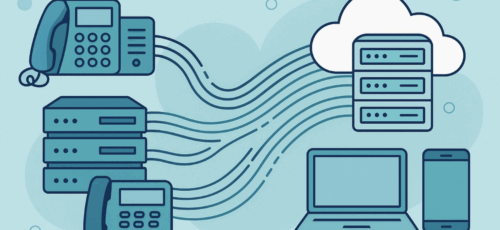VoIP can offer mobility, scalability, and reliability at a low cost if your business or client is switching from a traditional phone carrier. Minimal on-site infrastructure is required; the service works with most existing telephony devices and a stable internet connection. VoIP’s numerous advantages have led many businesses to adopt the communication service for their phones.
According to GlobeNewswire, the global VoIP market is expected to reach over $108 billion by 2032, with an annual compound growth rate higher than 10%. VoIP shows no signs of stopping, with new users and businesses adopting enterprise-grade VoIP solutions to better ensure their businesses’ continuous uptime of critical voice applications.
What Is VoIP?
Voice over Internet Protocol (VoIP) allows a business or user to make and receive calls over an Internet connection. Instead of using a traditional publicly switched telephone network (PSTN), carrier calls are routed through the internet using a VoIP provider’s rate centers. The caller uses a traditional phone, IP phone, softphone, or app on a mobile phone to make the call.
What Are the Recent Advances in VoIP Technology?
While VoIP was introduced in the 1990s, the technology has come a long way. Many flagship mobile phones use Wi-Fi calling, or VoIP, allowing users in areas with poor signals to make clear calls over Wi-Fi. Calling over LTE and 5G networks is also possible with VoIP technology. VoIP is also an integral component of any Unified Communications as a Service (UCaaS), providing businesses with cost-effective and reliable voice communication.
VoIP can be hosted in the cloud, allowing businesses access to a complete cloud-based calling solution with enterprise-grade features like a private branch exchange (PBX). Cloud-hosted VoIP offers several advantages, including near-unlimited scalability and worldwide reliability at a low cost.
Related: How Does Business Continuity Work with VoIP?
VoIP can also be used with Session Initiation Protocol (SIP) trunking. With a traditional PSTN carrier, trunking is provided by primary rate interface (PRI) lines, which carry 23 simultaneous channels and require an additional PRI to add more channels. SIP trunking is limited only by the business or user’s bandwidth, providing scalability at a low cost.
Voice APIs are also a relatively recent advance in VoIP technology. An application programming interface (API) allows two distinct software solutions to communicate through API calls, providing interoperability without changing the code of the software itself. A voice API allows application developers to integrate a click-to-call function, or customer relationship management (CRM) software developers to integrate a calling function into the CRM along with several other software and systems.
How Is VoIP a Game-Changer for Modern Businesses?
With the latest advances in VoIP technology, users have consistent, reliable voice communication from anywhere in the world with an internet connection, enabling communication and collaboration in remote office environments. During the 2020 COVID-19 lockdowns, businesses without a business continuity plan were caught off guard when they had to suddenly move to virtual office arrangements. Using a cloud-based VoIP solution, companies continued voice communications with their remote employees using IP phones, softphones, and mobile phones.
In the past, an interruption in phone service meant porting your number to another carrier, a process that could take days or weeks. VoIP with direct inward dialing (DID) ensures inbound calls are delivered to the correct recipient, allowing inbound calls to failover to another network when interruptions occur. When an employee is off-site or the office is closed, inbound calls to their DID can also be forwarded to another phone or mobile device with remote call forwarding.
Your client or business can use VoIP to replace or supplement an in-house PBX to provide enterprise-grade features to remote and in-office employees using a hosted PBX solution. SIP trunking with VoIP can also provide a communication solution for local, remote, or hybrid offices, allowing users to communicate at a low cost and providing the business scalability and control.
In addition to the business-enhancing benefits listed above, you can quickly integrate voice service into your business or client’s app, CRM, or system to provide calling or automation for a voice assistant or interactive voice response (IVR) system. Adding voice service to a system or software solution provides users with communication, collaboration, and convenience.
What Are the Reliability Benefits of VoIP?
Making and receiving calls over the internet using VoIP provides several benefits. Users can get a consistently high-quality calling experience wherever they have a stable internet connection, and VoIP networks can be highly resilient, allowing the network to scale for higher volumes of inbound calls and failover to another physical network if there is an issue.
Mobility and Flexibility
VoIP offers innate flexibility over traditional PSTN carriers. It is a cloud-based communication, allowing users to make and receive calls from various devices and any location with a suitable internet connection. Users can even use VoIP from mobile devices with a voice app, providing near-limitless mobility. It is ideal for offices offering flexible work arrangements, as employees do not need to be on-site to use the company’s voice lines and business phone numbers.
Scalability
Cloud-based VoIP is not only flexible but also inherently scalable. Your client or business can also scale its communication dynamically to ensure inbound calls are received. Administrators can add users and phone numbers from an easy-to-use web portal, and with a flexible metered payment plan, the organization will only pay for the calls made in a specific billing period. There is no costly infrastructure to invest in, and if the business experiences periods of higher call volumes, the network will expand to handle the higher call volume, and scale back down as the volume subsides.
Business Continuity and Disaster Recovery
VoIP’s flexibility and mobility make it a perfect disaster recovery and business continuity solution. The cloud-based voice service is less vulnerable to security issues and more resilient than an on-site communication solution that can be brought down by local power failures or natural disasters. Unexpected downtime is a threat to businesses of all sizes, with a study in Forbes indicating over 8 in 10 organizations reported at least one network outage within the last three years.
When your client or business uses VoIP, it can quickly respond to natural disasters, pandemics, network outages, and power outages that force on-site employees to work remotely. Since VoIP only requires a stable internet connection to provide voice service from anywhere, employees can continue operations from home or another office location.
For instance, if a storm causes an outage affecting the telecom lines connecting to the company’s office, employees can continue communicating with their teams and departments using VoIP from their home internet connection. Remote workers can still use the business phone number, unlike a landline that requires all users to be on-site, and calls can be forwarded to users’ mobile devices using remote call forwarding to ensure operations continue.
Related: Network Redundancy vs. Network Diversity
While a stable internet connection in the office can be seen as reliable, a disaster can shut it down completely. Having a way for users to continue operations without waiting for technicians to fix the lines provides disaster preparedness in a way that traditional telecom solutions cannot. A primary factor that sets the reliability of VoIP apart from landlines.
Network Reliability
While a telephony solution managed on-site may only have a single line and a backup, a cloud-based VoIP solution provides a worldwide network of rate centers with redundant routes to guarantee delivery without the cost of additional lines. A cloud-based voice provider with a reliable network will route calls to your business or client’s DID number. If a route is interrupted, the network will failover to another physical network, ensuring minimal interruptions to business calling with network redundancy. Users can also move off-site quickly and continue operations if there is an interruption to the office location’s internet connection or power source.
Build a Reliable VoIP Integration with a Resilient Voice Partner
Creating a reliable VoIP integration for your business or client does not require a significant investment in on-site systems or infrastructure, but it is vital to choose a partner that has a reliable network to ensure users can use the business phone system both on-site and remotely. When you partner with a reputable cloud-based communications provider, your business or client will have the uptime and reliability required to continue mission-critical operations under any conditions.
Flowroute’s business phone and voice SIP services are supported by the HyperNetwork™, providing business continuity and reliability with dynamic routing and physical failover networks to guarantee delivery. Your business or client’s VoIP service will have 24/7 availability and uptimes of 99.999% to ensure voice calling is always available. We monitor the network for suspicious activity like fraud, and provide features like DID phone numbers across the United States and remote call forwarding to prepare your company for disasters.
Get started with Flowroute to build a resilient VoIP solution,






